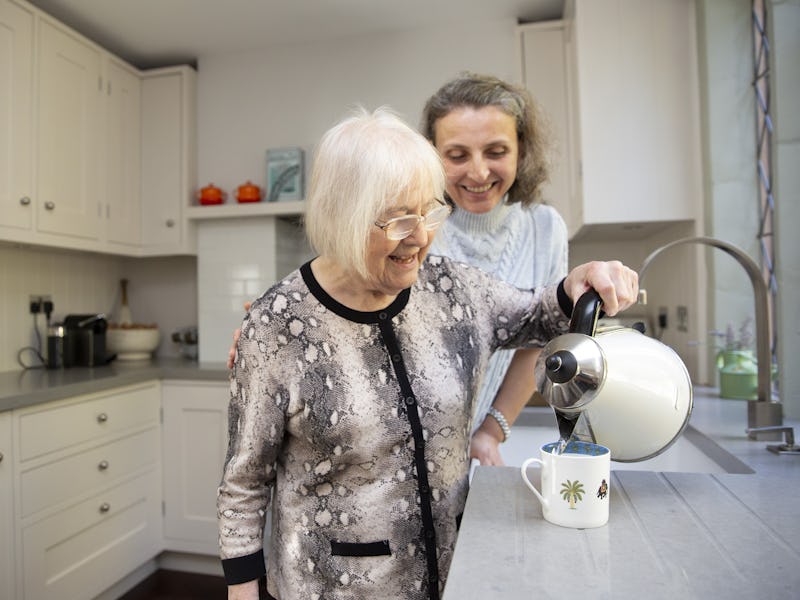| Previous Page: Treatments for Dementia | Next Page: Caring for Someone Living with Dementia |
|---|
The landscape of dementia care is changing. The historic term of ‘senile dementia’ is no longer in use, and living with dementia does not mean that lifestyle and liberty are immediately surrendered. While some lifestyle changes may be made as time progresses, planning ahead and making decisions about your lifestyle will enable you or your loved one to live well with dementia.
Coming to terms with living with dementia
The news that you or a loved one is living with dementia can be difficult to accept. Concerns and questions may all surface immediately, or they may develop over time. This is entirely natural. But by seeking support from loved ones, medical professionals and care providers, you will be able to fully understand the choices available to you. Opening up a dialogue with someone, whether they are a family member, a friend, a member of a support group or charity, will give you an opportunity to share your experiences and seek invaluable reassurance and support so you never feel isolated. The prospect of adapting your lifestyle over time may feel daunting, but it’s important to remember that absolutely everyone will change their lifestyle over time, for an infinite number of reasons. A diagnosis of dementia may present different challenges than others encounter in their lives, but with your support network, you will be able to make informed decisions to enable you to live a life you love.
Planning for the future
Dementia can bring about unexpected changes to your health and lifestyle and these new challenges can make it difficult to think about the future. However, it’s important to think ahead and planning for the future will not only ensure that you are able to make your own decisions about the life you want, but you’ll be able to communicate your wishes with loved ones, so they can act in your best interests when needed.
An advanced statement is not legally binding, but it is a document which outlines your preferences and wishes regarding your care and lifestyle in the future. If future decisions are made by a person on your behalf, any advance statement must be taken into account.
As part of your preparations, you may contact a care provider to discuss how they will be able to support you in the future. Although this prospect may seem daunting or even unnecessary in the early stages of dementia, sharing your advanced statement with an experienced and caring professional will help you establish your wishes for future care, and the transition to receiving support from carers won’t be so daunting.
If you would like to state your wishes in a legal capacity, you can:
Establish an advanced decision
Unlike an advanced statement, an advanced decision IS legally binding. An advance decision is a decision made whilst you possess mental capacity, where you can outline your refusal of a specific type of treatment at some time in the future. Although this can be difficult to discuss, an advanced decision will help you ensure you maintain control over the decisions made about your medical treatment in the future.
Establishing a power of attorney
A power of attorney gives your nominated adult ‘attorney’ the power to act legally on your behalf for financial and property matters, plus decisions on welfare and medical treatment if you lack the capacity to do so for yourself. Although not mandatory, it is advisable to establish a lasting power of attorney through a solicitor.
Specialist dementia care at home
With assistance from professional care providers, you will have the right support to enable you to live confidently, safely and independently. Your loved ones will naturally be concerned for your wellbeing, so inviting a care provider to support you in your home will give them reassurance and peace of mind. There are many options available and navigating these options may seem confusing and daunting at first, but with guidance and support, you’ll be able to make decisions which suit your circumstances and your lifestyle.
Visiting home care
Many care providers use different terms to refer to visiting home care. Some use the term visiting home care, others use daily home care or hourly home care and you may come across more variants still. No matter what label is attached to the service, it’s advisable to contact the care provider to discuss what support they offer with each of their services. At Trinity Homecare for example, ‘Daily home care’ is available from once a week to multiple visits each day and the level of support ranges from companionship and help with everyday household tasks, to support with aspects of personal care such as bathing and continence care. The benefit of visiting home care is that the frequency and duration of the visits you receive can be changed as your dementia progresses, and the bespoke support will ensure your welfare is at the very centre of every decision that’s made about your care. By remaining in the familiar comforts and routines of your home environment, you’ll be able to live the life you know and love, as independently as possible.
Live-in home care
In the later stages of dementia, you or your loved one may require more support than that which visiting home care can accommodate for. Live-in home care ensures that you or your loved one receives one-to-one bespoke full-time care from a carer (or carers) living alongside them in the home. The familiarity of our own home environments can help to make us feel safe and comforted, even if we are generally unaware of our surroundings in the later stages of dementia, the senses may still recognise elements of the home environment, which can be a source of comfort in times of distress. A live-in carer will be carefully selected by your care provider to ensure that they are experienced and a suitable match to your lifestyle and personality. Maintaining a regular routine is beneficial for someone living with dementia, and a live-in carer will enable you or your loved one to follow their daily routines and behavioural patters as freely as possible.
Care homes
Care homes offer a different environment altogether. While the buildings are secure and adapted for residents’ varying needs, the staff to resident ratio is 1:4 on average. The staff in a care home may be responsible for the care of numerous residents, a live-in carer will give you or your loved one their undivided attention. Care homes are also an unfamiliar environment and although many people living with advanced dementia often relocate to a care home, the routines, comforts and familiarities of home are lost, which can be distressing and unsettling. Staying close to loved ones, keeping pets, maintaining routines and many other aspects of life should be considered before making the decision to move into a care home.
Telecare and assistance technology
We’re all fortunate to live in a time of extensive technological development. New technologies such as smartphones and tablets are devices which we often take for granted, but the collaboration between new technology and the care industry has produced some interesting advances in assisted care. The traditional ways of recording care notes are beginning to be replaced with innovative new systems (such as TrinityConnect) which store care notes, medication records, alerts and other information in an app, which can be viewed and updated by carers, care management teams and loved ones. This is an encouraging step towards transparency in care and protecting the safety of sensitive information, which may have previously been left in a folder for anyone to read without permission. You may also encounter ‘telecare’, which are various pieces of technology designed to help protect the safety of a vulnerable person when they are unaccompanied. There is a vast array of devices available, and a reputable care provider will be able to offer advice and guidance about which options would be most suitable. Telecare devices can be used to support someone living with dementia if they are alone between carer visits, it enables the person to remain independent whilst enabling loved ones to respond to situations quickly in the event of wandering, falls and other alerts.
Living with dementia – helpful tips to live well
The progressive nature of dementia means that symptoms will develop and become more significant over time. The rate of the progression and they type of dementia may vary with each person, but there are many simple ways to live well with dementia.
Living a healthy lifestyle is important for everyone. A balanced and nourishing diet will help maintain your physical wellbeing so you can concentrate on pursuing the lifestyle you want. Remaining as active as possible is scientifically proven to boost your mood because your brain releases chemicals which promote confidence and happiness. So a healthy body and active lifestyle can really help improve all aspects of your wellbeing!
Maintaining your social life is vital for mental health and wellbeing. Engaging in local groups, hobbies and events will not only keep your mind active, but social interaction will combat feelings of isolation. Even if you wouldn’t usually join a group or organisation, engaging with others in a shared activity will help you or your loved one feel supported as part of a community, and it’ll also give you the opportunity to share your experiences and seek advice and guidance.
Creating the best possible environment – practical tips for the home:
- Keep a diary and write down things you want to remember
- Pin a weekly timetable to the wall
- Put your keys in an obvious place, such as a large bowl in the hall
- Have a daily newspaper delivered to remind you of the date and day
- Put labels on cupboards or drawers
- Place helpful telephone numbers by the phone
- Write reminders to yourself – for example, put a note on the front door to take your keys
- Programme people’s names and numbers into your phone
- Install safety devices, such as gas detectors and smoke alarms
- Put bills on direct debits, so you don’t forget to pay them
- A pill organiser box can be helpful for remembering which medications to take and when
| Previous Page: Treatments for Dementia | Next Page: Caring for Someone Living with Dementia |
|---|

You may also be interested in











